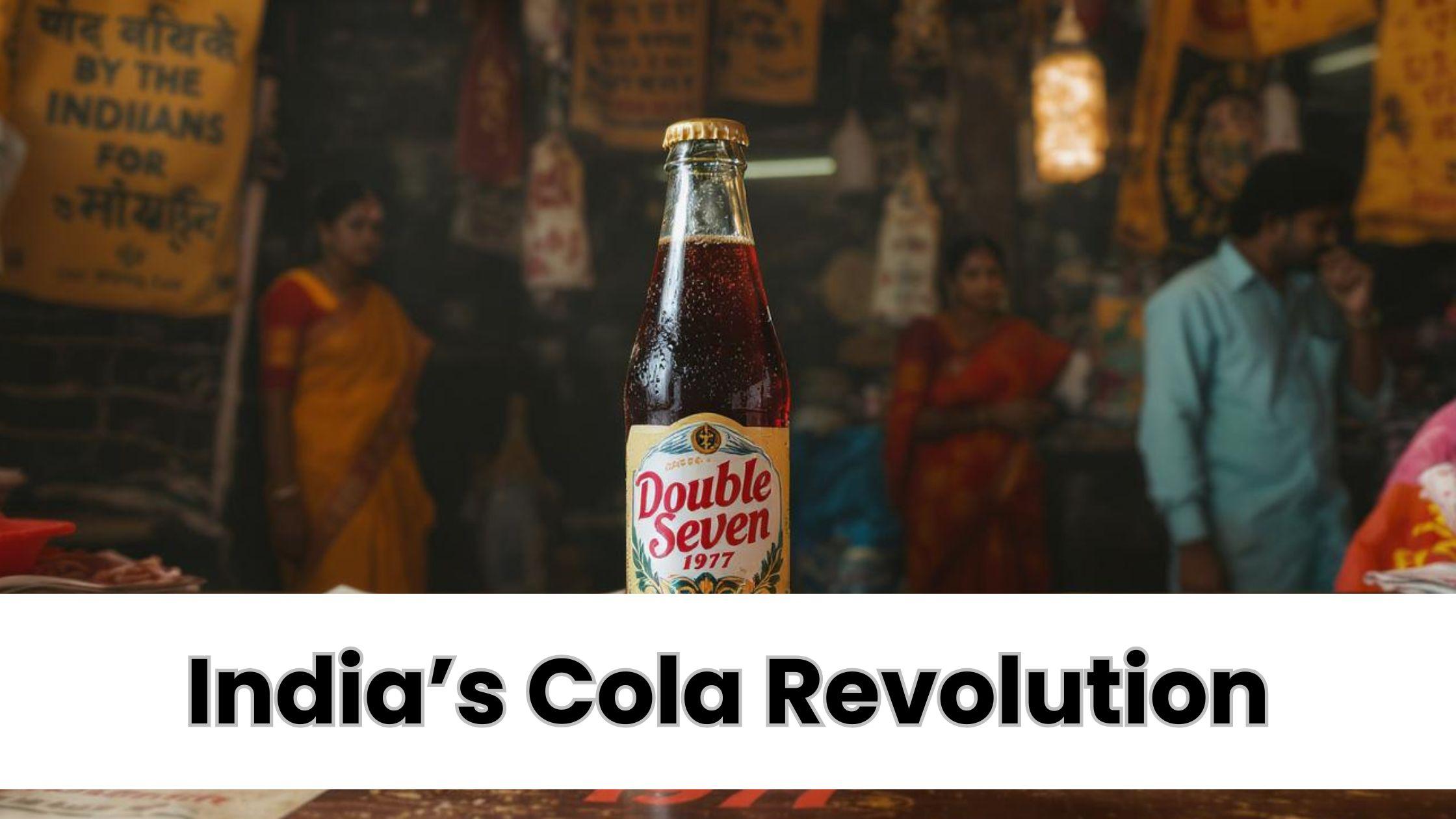Double Seven and the Politics of Cola in India

The launch of Double Seven in 1977 marked a pivotal moment in India’s Cola Revolution. After Coca-Cola exited India due to regulatory disputes, the government sought to introduce a domestic alternative capable of asserting national pride and economic self-reliance. Double Seven was more than just a beverage; it was a symbol of India’s ambition to compete with international brands while promoting the country’s manufacturing capabilities under the Janata Party government led by Morarji Desai.
The Birth of Double Seven
Double Seven derived its name from the year 1977, commemorating the end of the Emergency and signaling a new political era. Developed under Modern Food Industries and crafted at the Central Food Technological Research Institute in Mysore, the cola was one of India’s first state-backed consumer products to challenge global competitors. This ambitious initiative demonstrated India’s determination to reclaim market share for domestic brands while promoting self-sufficiency in the soft drink sector.
Marketing Strategy and Patriotic Appeal
Double Seven’s marketing strategy focused heavily on nationalism. Advertising campaigns emphasized that the cola was made in India by Indians, appealing to consumers’ patriotic sentiment. Billboards, posters, and radio spots reinforced the message that consuming Double Seven was an act of national pride. The brand aligned with the “swadeshi” movement, presenting itself as an Indian alternative to global cola brands and emphasizing the economic benefits of supporting domestic products.
Competition with Domestic Brands
Despite strong government support, Double Seven faced significant competition from established domestic cola brands such as Thums Up and Campa Cola. These brands had loyal consumer bases and robust distribution networks. Taste preferences also played a key role; many consumers found Double Seven’s flavor less appealing compared to Thums Up and Campa Cola. Brand loyalty and consumer habits proved difficult to overcome, limiting Double Seven’s potential for long-term success.
Distribution and Accessibility
Distribution presented another challenge for Double Seven. While the government funded production and marketing campaigns, the logistics of ensuring nationwide availability were limited. Retailers often prioritized brands with proven demand, leaving Double Seven underrepresented on shelves. This inconsistent availability hindered the brand’s adoption and prevented it from establishing a strong presence in the competitive Indian beverage market.
Political Influence and Public Perception
Double Seven’s close association with the Janata Party government influenced public perception. Its success was tied to the political fortunes of the ruling party; as the party’s influence declined in the early 1980s, government support diminished. Without sustained backing, the brand struggled to maintain consumer interest and visibility. By the mid-1980s, Double Seven had largely disappeared from the market, unable to compete effectively with both domestic and international brands.
Cultural Significance
Although short-lived commercially, Double Seven remains a notable part of India’s Cola Revolution. It symbolized a bold attempt by the government to create a homegrown product capable of competing with multinational brands. The cola sparked awareness of domestic alternatives and indirectly encouraged investment and innovation in the Indian soft drink industry. Collectors and historians continue to reference Double Seven for its unique branding, packaging, and patriotic messaging.
Lessons Learned
Double Seven’s journey provides important lessons for marketers and entrepreneurs. Patriotic messaging alone cannot guarantee long-term success; factors such as taste, product quality, distribution, and brand loyalty are critical. The brand’s experience demonstrated the importance of understanding consumer preferences and market dynamics, lessons that have shaped strategies for domestic and international beverage launches in India.
Impact on India’s Beverage Industry
Double Seven indirectly strengthened India’s beverage industry by highlighting domestic alternatives to multinational brands. Its introduction encouraged local investment and innovation in the soft drink market. Brands like Thums Up and Campa Cola benefited from the increased awareness generated by Double Seven, refining their marketing and distribution strategies to compete effectively. The launch acted as a catalyst for a more competitive soft drink market in India.
Strategic Insights
The story of Double Seven illustrates the complex interplay between politics, regulation, and business strategy. Coca-Cola’s exit created a market gap, and the government’s intervention demonstrated how political objectives can shape commercial initiatives. The brand also highlighted the challenges of state-backed enterprises in sustaining consumer interest and competing with private companies that prioritize taste, quality, and distribution.
Double Seven Cola remains a significant chapter in India’s Cola Revolution. Although it did not achieve lasting commercial success, it represented national pride, self-reliance, and political ambition. Its journey offers enduring lessons in marketing, distribution, consumer loyalty, and the interaction between politics and commerce. Today, Double Seven is remembered as a pioneering effort to create an indigenous cola brand and a key milestone in India’s beverage history.
Read Full Article : https://bizinfopro.com/news/marketing-news/indias-cola-revolution-how-double-seven-replaced-coca-cola/
About Us : BizInfoPro is a modern business publication designed to inform, inspire, and empower decision-makers, entrepreneurs, and forward-thinking professionals. With a focus on practical insights and in‑depth analysis, it explores the evolving landscape of global business—covering emerging markets, industry innovations, strategic growth opportunities, and actionable content that supports smarter decision‑making.
- Vibnix Blog
- Politics
- News
- Liberia News
- Entertainment
- Technology
- Εκπαίδευση
- Art
- Causes
- Crafts
- Dance
- Drinks
- Film
- Fitness
- Food
- Παιχνίδια
- Gardening
- Health
- Κεντρική Σελίδα
- Literature
- Music
- Networking
- άλλο
- Party
- Religion
- Shopping
- Sports
- Theater
- Wellness



